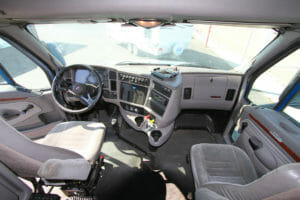
People choose to make a living driving a truck for a variety of reasons; maybe you want to see the country, make good money, and experience the independence of the open road. Your first year of being a truck driver will be a rewarding challenge, and you want to ensure you get good advice as you navigate the maze of unexpected turns along the way.
The first year of being a truck driver will probably be the most stressful in your career. In trucking school and OTR training, you cram so much information into your brain that it’s hard to keep up! It may be a few years before you are truly confident in your trucking skills, but the habits you form in this first year will build a foundation as you continue to learn.
Settling In.
In an average truck, there is very little space. Do not travel with more “stuff” than you need, and keep your belongings clean and tidy. You might be a clutter bug in your garage at home, but on the truck, space is at a premium.

Being a truck driver and living on the truck means having a lot of your earthly possessions stuffed in cabinets, cubby holes, door pockets, and overhead compartments.
Finding important things can be a challenge if there is no “method to the madness.” It can also be a safety issue if you have things lying all over the floor, rolling around under your feet, blocking your path, and falling on your head.
Law enforcement officers might target a truck that is cluttered and dirty, since it can be an indication you’re careless about other parts of your equipment as well.
And finally, cleanliness improves mood and invites relaxation. When you live in a cluttered environment, you may be more prone to irritation and feelings of loss of control. It’s much easier to relax when things are clean.
Plan Your Trip.
When you were in trucking school, you received a lot of information about safety and maintaining your equipment. These things are critical to your success in trucking, of course, but there is another thing you must do if you want to learn to operate efficiently. You’ve probably heard the saying, “If you fail to plan, you plan to fail.” Before you set out on a trip, take some time to make a good trip plan.
This includes how you will best utilize your legal driving hours, where you will get fuel, where you will take your breaks, when you anticipate arriving at customers, and how many log hours you will have available when you’re ready for your next load.
In order to plan these things, you should learn how to read a trucker’s atlas. GPS can be notorious for leading truck drivers to a random cornfield. Learn where each state is on the map, and memorize all of the two-letter state abbreviations. Buy a good truck stop guide to help you decide where you want to stop for breaks, showers, laundry, etc. Practice using military time (much of the industry uses military time in their load assignments).
Fatigue.
There are many reasons you could be susceptible to fatigue as an OTR truck driver. You might still be adjusting to sleeping in the truck, especially if you are part of a team and the truck is bouncing over potholes.

You might have just been through an emotionally draining day. Your body might be dealing with natural cycles that cause you to feel drained and fatigued, regardless how much sleep you just had. You might be dealing with financial stress or family conflict that keeps you up at night worrying.
This is an industry of schedules and deadlines, but please remember that there is no load out there that is worth risking your life and the lives of others on the road. It is imperative that you feel alert, focused, and at the top of your game before you get behind the wheel.
And if you must find a safe place to shut down, contact your company and let them know what’s going on.
There are a lot of energy drinks and supplements, potions, and tonics out there to keep your eyelids propped up, but there is no replacement for sleep.
As you gain experience in OTR trucking, you learn to recognize your body’s way of communicating with you. Think of sleep like the IRS. You can get behind on your payments for a little while, but eventually the IRS will come looking for their money. When they do, they don’t care if it’s a convenient time for you or not – they will take what’s coming to them.
Likewise with sleep, you can drink some coffee and roll the window down for a while, but eventually sleep will come for you. When it does, it won’t care if you’re passing a school bus or descending a steep mountain grade. Do not allow your body to go past its limit. Shut it down.
Communication.
There will be many times when things won’t go your way. Your truck will break down; you will blow a tire; traffic will come to a complete stop at the least convenient time; etc. Whatever the reason, it is important to stay in regular communication with your company and be honest about the delay.
Trucking companies realize that things don’t always go as planned, and there are often things they can do to help resolve the issue. They might push the appointment back a bit, reschedule it, or find a team who can swap loads with you and get your load to the customer on time.
If you are embarrassed and decide to just keep quiet, you don’t give them that opportunity and you are at risk of being charged with a service failure. If you get too many hits on your service record, you will be seen as untrustworthy. Don’t let this happen to your reputation.
Protect Yourself.
Many new OTR truck drivers worry so much about losing their job that they will do as they are told, regardless whether the instruction is safe, legal, or prudent.

An unscrupulous dispatcher might tell you to disregard the ice storm and get to the customer as soon as possible.
A trainer might force you to drive the night shift exclusively, even after you have made it clear that you can barely stay awake at night.
The maintenance department might tell you to ignore the sidewall bulge in the tire and keep going because tires are just too expensive.
In your first year of being a truck driver, plenty of people tell you what to do. Use good sense when you’re told to do something that doesn’t sound right. Remind people that safety is your first priority, and if your job is threatened, contact your company’s safety department.
There are a lot of people counting on your judgment when you are behind the wheel: you, your family, your fellow motorists, your team driver, and even your customers. Your driver training can teach you how to drive, how to read a map, how to maintain your equipment, but it cannot teach you good judgment. Protect yourself!
Get Good Advice.
For your first year of being a truck driver, where you look for useful information makes a huge difference to your success. Nowadays, anyone can post anything online, whether they’re qualified or not.
Twenty years ago, the CB radio was a good tool for connecting with other drivers, getting advice, asking for directions, recruiting help with stubborn equipment, and sometimes finding friendship along the way. It was also a place of vulgarity, hate, sexism, and overall abusive behavior. The good and the bad were locked in a constant battle. It was the best version of social media for truck drivers back in the day.
CBs are still around, but fewer people use them now that we have GPS, cell phones, and internet. If you want a taste of the CB world, just browse a trucker’s Facebook thread, and you’ll witness that same struggle between the good and the bad. A single innocent question can elicit a torrent of different responses, many of them sarcastic, accusatory, belittling, evasive, or abusive. And by the time the questioner gets through reading all the nonsense spewing forth from their screen, they may be more confused than they were before.
Our first suggestion to you would be to avoid getting all your information from public social media groups. Instead, look for reputable books, articles, and instruction guides to give you the best advice. That’s what we’ve provided at the ClassADrivers.com “Become a Truck Driver” section. And we also have helpful forums on ClassADrivers.
Have Some Fun.
If you are like most new drivers, you are probably feeling a blend of excitement and anxiety, quiet hopes and a whole lot of uncertainty. Once you find yourself out on your own in your new trucking career, you may feel a lot of stress without your trainer at hand to help you deal with the day-to-day uncertainties.
Cutting the apron strings and getting into your own truck is perhaps the scariest and the most exhilarating feeling you will have as a new driver. For weeks you have had to follow your trainer’s rules and abide by the schedule set out for you. But now that you are on your own, you can arrange your truck the way you like it, frequent your favorite truck stops, choose your own routes, make your own plans, and do your own thing.
Now it’s time to learn how to relax and have some fun while you’re on the road. When you have some extra time, park your truck in a safe place and get a ride to the beach, to the movie theater, to a shopping mall, or to a nice restaurant. Rent a car and find some waterfalls, do some bird watching, or hike a wooded trail. Don’t focus so much on making a living that you forget to enjoy this beautiful country you are traveling. You are the master of your destiny, and the country is yours to discover!
